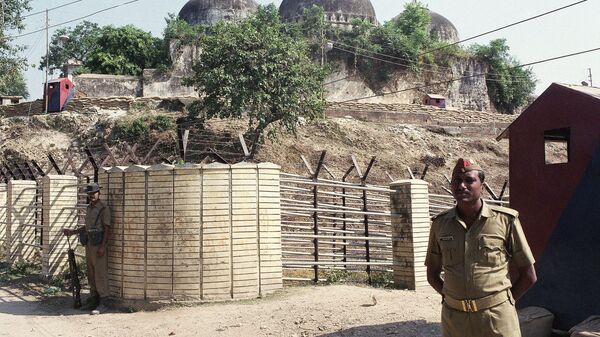India's top probe agency CBI has actually "failed the nation", Justice (Retd.) Manmohan Singh Liberhan said on Thursday, a day after a special CBI court acquitted all of the accused in the much awaited verdict related to the 16th century Babri Mosque’s demolition in 1992.
Justice Liberhan had headed a judicial commission which inquired into the circumstances leading to the destruction of mosque, or the Ram Janambhoomi-Babri Masjid structure.
The special CBI court held that the demolition of the mosque was not premeditated and that there was no criminal conspiracy behind it. "Those who climbed on the dome, they were anti-social elements", the court added.
The special court also held the authenticity of audio and video clips produced by India's federal probe agency – the Central Bureau of Investigation (CBI), were inadmissible or did not prove anything.
Asked if he was disappointed by the trial court judgement, which were contrary to his findings, Justice Liberhan told Sputnik: "My job was to decide according to the facts and evidence before me. Why should I feel bad about it or good about it or disappointed about it?"
"I still stick to my findings", asserted the 82-year-old former Judge of the High Court of Punjab and Haryana, who submitted his findings to then Prime Minister Dr Manmohan Singh in June 2009.
Justice Liberhan said it was "good fortune for the accused and misfortune for the nation", that the conclusions in his report did not find any common ground with the trial court's verdict.
The ex-judge reiterated that former federal cabinet minister Uma Bharti, one of the 32 accused to be acquitted, had actually admitted her role in the matter.
"It is there (in the report), she said 'Babri Masjid Tor Do (Demolish the Babri mosque)'. Her statement is a part of my report and evidence before me".
The report submitted by Justice Manmohan Singh Liberhan reads, "Prognosis of the evidence leads to the conclusion that the mobilisation of the karsevaks (volunteers) and their convergence to Ayodhya and Faizabad (areas) was neither spontaneous nor voluntary. It was well orchestrated and planned".
The Supreme Court of India had also observed while settling the ownership right of the disputed land in Ayodhya in its judgement on 8 November 2019, that "the mosque was brought down in a calculated act".
"During the pendency of the suits, the entire structure of the mosque was brought down in a calculated act of destroying a place of public worship. Muslims have been wrongly deprived of a mosque which had been constructed well over 450 years ago", reads that judgement.
Referring to an observation by the apex court in its 8 November 2019 judgement that "the destruction of the mosque and the obliteration of the Islamic structure was an egregious violation of the rule of law", the special court observed that such a group of people could be called anarchists and could not be Ram-Bhakhts (devotees of Lord Rama) as they were bent on demolishing the disputed (structure) and that the Supreme Court's observation was in the context of these people only.
Among those accused in the case were two former chiefs of India's nationalist Bharatiya Janata Party (BJP) – Lal Krishna Advani and Murli Manohar Joshi.
The other accused included two former state chiefs, Uma Bharati and Kalyan Singh, besides a host of leaders of BJP's ideological allies.
In a related case about the same structure, on 8 November 2019, India's apex court settled a decades-long land dispute case between Hindus and Muslims, and handed over the site to Hindus to build the Ram Temple.
Prime Minister Narendra Modi held the groundbreaking ceremony for the temple on 5 August this year at the venue, fulfilling his party's decades-old poll promise.




